Frequently Requested Reports and Publications
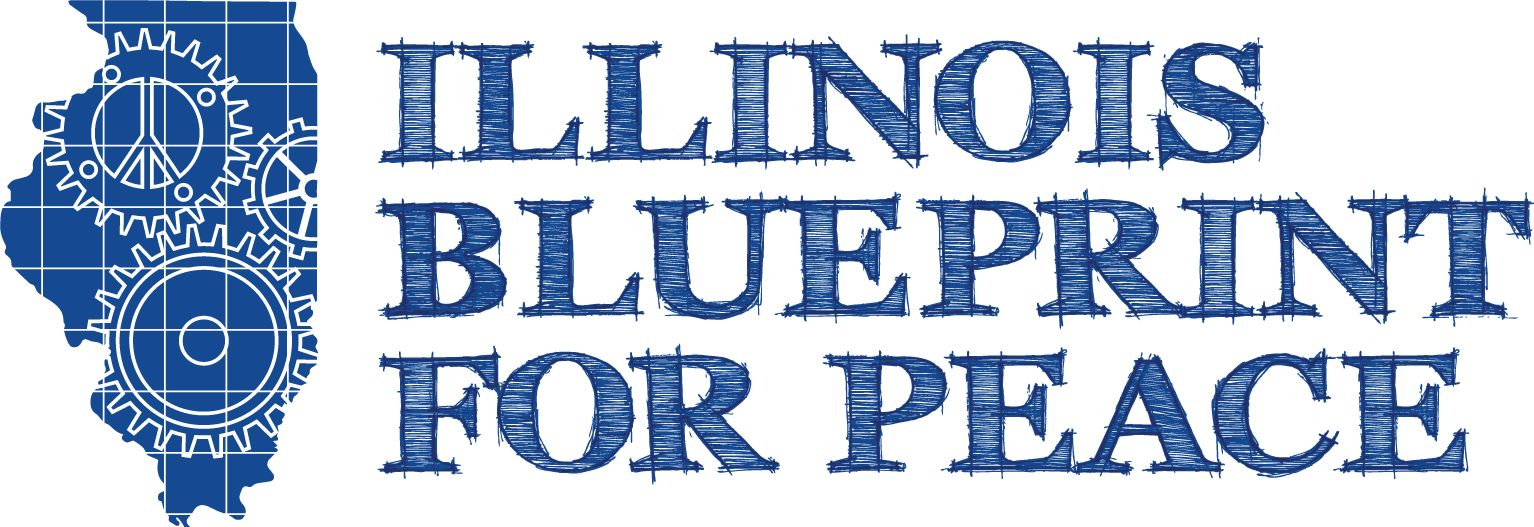 The Illinois Blueprint for Peace – a framework of recommendations to build peace and prevent gun violence in Illinois – was created by a statewide coalition of organizations and individuals committed to supporting and advocating for proven approaches to bring peace and healing to Illinois communities. CFJC helped lead the coalition that produced the Blueprint. By addressing the underlying trauma that shapes decisions to carry guns and the harm caused by gun violence, the Illinois Blueprint for Peace contains a series of more than three dozen recommendations to improve the lives of Illinoisans impacted by gun violence and to reduce future gun violence.
The Illinois Blueprint for Peace – a framework of recommendations to build peace and prevent gun violence in Illinois – was created by a statewide coalition of organizations and individuals committed to supporting and advocating for proven approaches to bring peace and healing to Illinois communities. CFJC helped lead the coalition that produced the Blueprint. By addressing the underlying trauma that shapes decisions to carry guns and the harm caused by gun violence, the Illinois Blueprint for Peace contains a series of more than three dozen recommendations to improve the lives of Illinoisans impacted by gun violence and to reduce future gun violence. "Community Safety & the Future of Illinois’ Youth Prisons," is the result of a multi-year research endeavor, which included interviews with a wide variety of policymakers, a survey of over 150 stakeholders, the collection and analysis of data about the state’s justice system, and an extensive review of academic and practitioner research. The series of reports will be published throughout 2018 and will culminate in a detailed set of recommendations, consistent with calls from researchers and practitioners nationwide, for a five-year plan to end Illinois’ use of large, adult-modeled prisons for youth and to expand alternatives to incarceration.
"Community Safety & the Future of Illinois’ Youth Prisons," is the result of a multi-year research endeavor, which included interviews with a wide variety of policymakers, a survey of over 150 stakeholders, the collection and analysis of data about the state’s justice system, and an extensive review of academic and practitioner research. The series of reports will be published throughout 2018 and will culminate in a detailed set of recommendations, consistent with calls from researchers and practitioners nationwide, for a five-year plan to end Illinois’ use of large, adult-modeled prisons for youth and to expand alternatives to incarceration.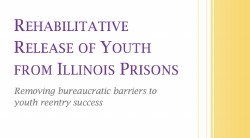
“Rehabilitative Release of Youth from Illinois Prisons” recommends the removal of bureaucratic barriers to the successful reentry of youth to their home communities.
“Illinois is out of step with the rest of the nation and with what juvenile justice experts and research have determined are best practices for successfully transitioning youth from prison back to home communities,” according to the report issued by CFJC in 2016. “To advance public safety by correcting this failing and improving opportunities for youth to have successful lives, Illinois should remove responsibility for youth prison release decisions from the Illinois Prisoner Review Board. Instead, the Illinois Department of Juvenile Justice should be empowered to make the decisions using timely, responsible release procedures supported by due process protections.”
Illinois is the only state in the country that gives an adult-focused parole board the power to release youth. The other 49 states, representing 95 percent of national commitments to state secure confinement, use other mechanisms.
Read the full report with appendix (pdf)
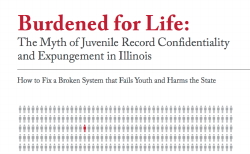
Written in partnership with CFJC, “Burdened for Life: The Myth of Juvenile Record Confidentiality and Expungement in Illinois” was released in 2016 by the Illinois Juvenile Justice Commission. The report explains that Illinois laws and policies governing the treatment of court and arrest records of youth “threaten public safety, produce substantial unnecessary costs, and impede young people’s ability to transition to productive adulthood."
Although state law long has emphasized the principle that a youth’s mistakes should not brand that child for life, Illinois youth have been harmed by the erosion of confidentiality protections and the extreme difficulty and expense of erasing a record through the expungement process, according to the report.
In Illinois, tens of thousands of juveniles are arrested each year, and the largest majority of those arrests by far are for non-violent offenses. Over the last decade, only three of every 1,000 arrests – less than one-third of one percent of juvenile arrests – were expunged in Illinois, the study determined.
Read the full report (pdf)
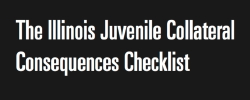
Prepared in 2015 by CFJC, the “Illinois Juvenile Collateral Consequences Checklist” provides attorneys, judges and other juvenile justice professionals with information on the short and long term consequences of juvenile adjudications of delinquency in Illinois.
It is the juvenile defense attorney’s responsibility, prior to proceeding with an adjudicatory hearing or admissions colloquy, to explain to his or her client these potential future consequences of a finding of guilt in juvenile court. Such consequences, known in the law as “collateral consequences,” might take the form of a penalty, disability or disadvantage imposed on an individual as a result of the adjudication.
The Illinois Juvenile Collateral Consequences Checklist (pdf)
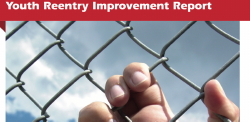
After a year of intensive data analysis and file review assisted by CFJC students and staff, the “Illinois Juvenile Reentry Improvement Study” was issued by the Illinois Juvenile Justice Commission. The report includes an unprecedented amount of data and insight into the juvenile release, reentry, and revocation systems.
Illinois Juvenile Justice Commission Youth Reentry Improvement Report (pdf)
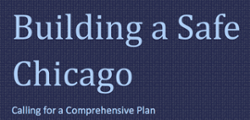 CFJC and more than four dozen community groups and criminal justice reform advocates issued a 2016 report urging Chicago’s elected leaders to reject reactionary and unproven crime fighting policies and instead attack the root causes of violence with a comprehensive crime prevention plan.
CFJC and more than four dozen community groups and criminal justice reform advocates issued a 2016 report urging Chicago’s elected leaders to reject reactionary and unproven crime fighting policies and instead attack the root causes of violence with a comprehensive crime prevention plan.“Building a Safe Chicago” argues against mandatory minimum prison sentencing schemes and in favor of a comprehensive plan that should include:
Expansion of community-based programs to improve social conditions that have led to increased demand for illegal weapon possession; reduction in illegal handgun availability by regulating gun shop owners; reduction in gun possession charges by identifying and addressing the causes of the repeat offenses; enactment of the reforms advocated by Mayor Emanuel’s Police Accountability Task Force; and economic development initiatives in high poverty neighborhoods.
“An intelligent and equitable public safety strategy will realign public spending priorities to channel resources into strengthening — not suppressing — citizens most at risk, while paying special attention to reducing opportunity gaps across all public services,” according to the report. “Doing so will create a smarter, healthier, more stable and productive Illinois – and a safer Chicago.”
TESTIMONY AND BRIEFS
CITY OF CHICAGO CURFEW ORDINANCE
- Stephanie Kollmann, CFJC Policy Director, written testimony submitted to the Chicago City Council on May 23, 2022. Hearing on Ordinance O2022-1596 (introduced May 20, 2022), expanding youth curfew. Testimony explains why the proposal to impose new curfew restrictions on 17-year-olds is draconian and “the wrong move at the wrong moment.” The proposal contradicts the city’s official reduction policy, which does not encourage more police engagement with youth and explains that criminal justice involvement can increase the risk of violence.
CARJACKING DATA
- Stephanie Kollmann, CFJC Policy Director, testified at the Feb. 16, 2021, Joint Hearing of the Illinois Senate Public Safety Committee and Illinois Senate Criminal Law Committee. Subject Matter: Public Safety Outcomes Update. Kollmann testified that while reports of vehicular hijacking have increased during the COVID-19 pandemic, there has been a decrease in several other crime categories. Kollmann said crime report and arrest data provide an incomplete picture of who is responsible and the reasons for the rise in carjackings across the nation. Most carjacking cases have not been resolved, making it unclear how many youth have been involved.
PROPOSED CPD CONSENT DECREE
- In comments presented Oct. 12, 2018, to U.S. District Judge Robert M. Dow Jr. in the State of Illinois v. City of Chicago lawsuit, the Children and Family Justice Center suggested strengthening the proposed consent decree related to the Chicago Police Department’s use of excessive force against minors.
- Letter to Attorney General Lisa Madigan, Aug. 17, 2018, CFJC endorsed the U.S. Department of Justice’s conclusion that CPD has demonstrated a pattern or practice of unreasonable force that specifically includes the use of excessive force against minors. We support revisions to the proposed consent decree as outlined by community group plaintiffs in both suits (State of Illinois v. City of Chicago and Campbell v. City of Chicago) in the strongest possible terms.
CPD GANG DATABASE
- Stephanie Kollmann, CFJC Policy Director, testified before the Illinois Senate Public Health Committee on April 20, 2018. The committee heard Kollmann explain why the Chicago Police Department’s gang database is both over-inclusive and inaccurate — failings that make it damaging to innocent individuals and an unworkable crime-fighting tool.
JUVENILE PRISONS
- Julie L. Biehl, CFJC Director, appeared before the Illinois House Appropriations - Public Safety Committee on Dec. 5, 2017. The committee held a public hearing devoted to the topic of Safety in the Illinois Department of Juvenile Justice and the Illinois Department of Corrections.
SEX OFFENDER REGISTRY
- Stephanie Kollmann, CFJC Policy Director, testified before the Illinois Sex Offenses and Sex Offender Registration Task Force in September 2017. The subject of her testimony was "Lessons Learned from the Juvenile Registry Reform."
GUN CRIME SENTENCING
- Stephanie Kollmann, CFJC Policy Director, testified before the Illinois House Judiciary – Criminal Law Committee on May 25, 2017. She was asked to preview research done by law students on the topic of gun possession sentencing in all 50 states.
JUVENILE LIFE WITHOUT PAROLE
- Brief and Argument of Amicus Curiae submitted to the Illinois Supreme Court in support of petitioner-appellee in People v. Buffer.
For Teens
Read our graphic novel
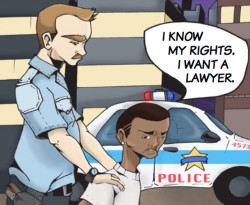 |
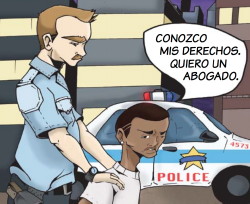 |
| English (pdf) | lea nuestra novela gráfica en español (pdf) |
Learn about the rights of Illinois youth in the juvenile justice system. Made with the help of the Mental Health and Juvenile Justice Action Network of the Models for Change Initiative. We've distributed 100,000 copies already!
For Parents

Read our parent handbook
Need a guide through the juvenile justice process for your family? Learn along with The Juvenile Justice System: A Guide for Families in Illinois (pdf).


